- This article is about the North American Governor-General. For the Mexican Senator, see Douglas Watson (planter).
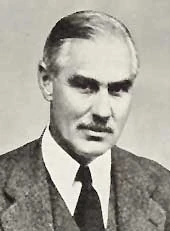
Governor-General Douglas Watson.
Douglas Watson was the fourteenth Governor-General of the Confederation of North America, serving from May 1929 to February 1938. He was the fourth man to win a mid-term appointment as governor-general, and the first to succeed after his predecessor's death.
Cabinet Minister and Succession Crisis[]
Watson served for six years as Minister for Home Affairs in the Cabinet of Governor-General Henderson Dewey, where he played an important role in assisting emigrants taking part in the Galloway Plan.
Following Dewey's death on the morning of 10 May 1929, Majority Leader John Jenckinson informed the press that the Liberal Caucus of the Grand Council would convene at nine o'clock the following morning, and would not adjourn until a new governor-general was selected. However, the Grand Council was not in session at the time, and only half of the Liberal Caucus was actually in Burgoyne. A quorum was not achieved until the morning of the 12th, consisting of 71 out of 94 members.
Watson was one of three leading candidates among the members of the Liberal Caucus, the others being Manitoba Governor Foster McCabe and Minister of Finance John Hopkins. Ten of the Manitoba councilmen were still absent when the Liberal Caucus made its selection, which prevented McCabe's selection, and Watson had closer ties to the caucus than Hopkins. Following his selection, Watson made a vitavised speech in which he pledged the fulfillment of Dewey's programs, "with priority given those . . . which will increase opportunity for young North Americans."
First Term[]
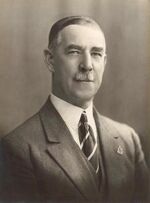
Owen Galloway.
Watson continued Dewey's practice of consulting periodically with Owen Galloway, and succeeded in creating the impression that he had Galloway's support. Watson also revived Christopher Hemingway's custom of making annual tours of the C.N.A. As promised in his first speech, Watson undertook to gain passage of Dewey's proposed reform of the National Financial Administration in 1930, effectively decentralizing the agency and increasing its financings. Watson also increased spending on the C.N.A.'s highway system, subsidized airmobile travel, and established a medical research institute called the National Health Administration.
Watson was a shrewd political leader who understood the inner workings of the Grand Council even better than Dewey had. He also used Dewey's memory to gain votes for legislation he wished to see passed. As late as October 1932, he would tell reporters that he was only serving in Dewey's place. This prompted an editorial in the Burgoyne Times on 15 October saying, "Mr. Watson protests too much. We all know what Mr. Dewey did and did not do, and how Mr. Watson's plans differ from those of his predecessor. The Governor-General is a most adept and effective leader, and to continue to use the name of Henderson Dewey is not only unnecessary, it is unseemly."
Watson was also criticized for his reform of the N.F.A. Following passage of Dewey's bill, financings increased immediately, especially in the western confederations, while the amount of the average financing declined and the failure rate rose steadily. The ratio of assets to liabilities fell, and the quality of the assets was lower. Charles Gross, in an op-ed in the 12 March 1934 New York Herald, said that the N.F.A. was starting to resemble "a Manitoban enterprise of dubious nature." Responses to Gross's piece included defenders of Watson's reform who thought that the Administration was "at last serving the needs of the people," and pointed out that "in an expanding economy, risks are really opportunities, and so are acceptable." In fact, between 1930 and 1934 the gross national product of the C.N.A. increased from N.A. £97.8 billion to N.A. £120.6 billion, the most rapid increase since the time of the Hemingway administration.
Watson continued the isolationist foreign policy that had been established by the People's Coalition and continued by his predecessor. However, during the signing of the airline subsidy bill on 18 June 1932, Watson remarked, "The old isolation will not do. We are hours from the major cities of Europe and the Orient, and not days or weeks. We must rethink our positions constantly."
1933 Elections[]

Harley Shaw.
Watson was considered unbeatable in the 1933 Grand Council elections, which presented the P.C. with a dilemma which was represented by their two leading candidates. Harley Shaw of the Southern Confederation represented those who sought to emulate Watson's policies, while Councilman Bruce Hogg of Northern Vandalia represented those who wished to reject them. Shaw himself had supported many of Watson's programs, including his expansion of the N.F.A., though he claimed they had been mishandled. Shaw also agreed with Watson that the C.N.A. needed a stronger foreign policy, and he pledged himself "to seek a more reasonable relationship with the United Empire if elected."
Hogg, however, charged the N.F.A. with "irresponsibility," and Watson with "pandering to the basest elements of our society." He also called Watson's tentative explorations overseas, "an invitation to disaster." Their supporters engaged in a bitter struggle at the Coalition's national convention in Michigan City in January 1933 that left the party divided and dispirited. Shaw was able to gain the nomination, and Hogg conceded gracefully, pledging himself to work for a Coalition victory.
The combination of prosperity, redistricting, and the high regard for Watson's late predecessor resulted in the greatest electoral victory in the C.N.A.'s history up to that time. Afterwards, Shaw remarked that, "In the beginning I thought we might take it all. Then I hoped we might squeak out a victory. Toward the end I became assured that we would lose by a fairly large margin. But I was not prepared for Armageddon." Following his victory, Watson pledge himself to a continuation of the policies "which have worked so well in the past, and will benefit us still more in the future."
European Tour[]
A month after his victory, on 12 March 1933, Watson announced his plan to embark on a European tour, "so as to better understand the peoples and leaders of these nations, which, in turn, will enable our country to more effectively play its proper role in international affairs." This represented the first time a North American governor-general would leave the nation's soil while still in office. Although Watson wished to fly to Europe in order to dramatize the closeness of the two continents in terms of travel time, he was disuaded by his Cabinet, who feared that the airmobile was not yet safe enough for the voyage. However, once in Europe, Watson was able to fly between the national capitals he visited, from Berlin to Paris to Amsterdam to London.
Watson's "grand tour" lasted a month, during which time he was in constant communication with Burgoyne, while Minister of Home Affairs Emery Collins presided over Cabinet meetings. In London, Watson had a private meeting with the King, and addressed Parliament. Introducing Watson, Prime Minister George Bolingbroke called him "the leader of a great nation, a man of extraordinary vision, and a most welcome visitor to our shores." Bolingbroke called the close relations between Great Britain and the C.N.A. "a model for all mankind," and said, "We are brothers because men wiser than we saw the need for self-government in North America, and we shall stand united no matter what the foe, no matter what the problem." Watson responded by saying, "Our loyalty to the Crown remains undiminished, and our relations with the Empire continue to be that of brothers." The tour was a success, as Watson charmed his hosts and won greater popularity in the C.N.A.
Watson reported on his tour in a vitavised address to the Grand Council on 7 May. In his address, he stressed the bonds between Britain and the C.N.A., spending relatively little time on his activities in the Germanic Confederation, France, and the Netherlands. It seemed to his audience that the tour had created much good will, but accomplished nothing concrete.
Foreign Policy Shift[]
The next day, Watson held a special Cabinet meeting in which he revealed a more serious side to his tour. For the past decade, the Germans had been expanding into British spheres of influence in Asia and Africa, with German businessmen receiving oil concessions in the Ottoman Empire which might lead to German control over Middle Eastern oil supplies. This would force the C.N.A. to depend on the United States of Mexico for its oil, a situation that every governor-general since Hemingway had worked to avoid. In addition, the Germans were expanding their military strength, and Watson claimed that "we must enlarge our military and naval forces, and create an air arm second to none."
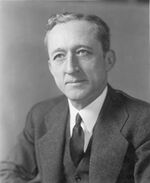
Courtney Judd.
Minister of Agriculture Henry Evans thought that Watson was exaggerating the threat posed by the Germans, and insisted that it would be cheaper to buy their oil from the U.S.M. than to commit to defending the Turks from the Germans. Watson responded by bringing in the North American ambassador to Mexico, Marshall Gipson, who revealed that the Mexicans and Germans were negotiating an alliance. Minister for Foreign Affairs Courtney Judd then explained the geopolitical situation: Japan had already clashed with Germany and Mexico in China, while the United Empire was weaker than it appeared, with member states Australia and India indicating that they would not allow themselves to be drawn into a war that did not affect their vital interests. Judd stated that war might break out within a year in China or the Ottoman Empire, and if it did, the British would be defeated. Watson concluded the meeting by saying, "In the face of this, we must draw closer to the Empire and re-arm. There is no alternative. If Britain falls, North America will be next."
In spite of Evans' objections, the Cabinet voted to support Watson. Three weeks later, negotiations began in London for an Anglo-North American alliance, and on 1 August Watson requested an increase in military spending from the Grand Council. Hogg claimed that Watson was "taking us to the edge of the chasm," and Evans resigned from the Cabinet in September. Twenty-nine Liberal Councilmen sent Watson a petition asking him to "reconsider the appropriations bill."
Watson remained resolute. He told Hogg and his other critics, "If you are correct, we shall have spent several tens of millions of pounds unnecessarily; if war comes, the replenished armed forces will save the nation. An army is like an insurance policy. You hope you will not need it, but if you do, then its value is difficult to measure."
Impeachment Crisis[]
The Grand Council appeared ready to pass Watson's appropriations bill by the summer of 1934. However, on 1 July 1934, Galloway spoke out on the issue during his weekly Galloway Playhouse address. He strongly opposed Watson's arms program, calling it "unwise, unnecessary, and more likely to bring us to war than to prevent a conflict." He urged councilmen of both parties to reject the appropriations bill, and devote their time to "more pressing internal problems that face us today."
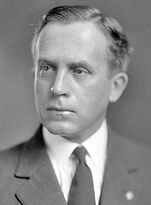
Herbert Lee.
Public opinion turned against Watson overnight. A citizens' committee was formed to support Galloway for governor-general, and a protest march on Burgoyne against the arms program attracted over two million people. On 24 July Majority Leader Herbert Lee was deposed and replaced by Charles Dorsey, an opponent of rearmament. A week later, three members of Watsons' cabinet resigned. On 10 January 1935, Hogg introduced a bill of impeachment against Watson.
Watson refused to back down. He continued to spend earlier military appropriations, and diverted funds from discretionary accounts to build up an air arm. He told his son, Douglas Watson, Jr., "It is strange. If I am right and our arms program prevents war, no one will know it, and I will be destroyed. Should I be wrong, and war does come, then I will be destroyed anyway. It seems my destiny is already determined, but we shall never know how or why."
International events worked in Watson's favor. The Germans and Mexicans did indeed sign a military alliance in 1934, leading to an Anglo-French alliance and the start of an international arms race. The Japanese Navy was ordered on the alert in March 1935, and tensions continued to increase in Europe and Asia. This allowed Watson to survive Hogg's impeachment hearings, as a majority of the Grand Council came to believe that "Douglas Watson's insurance policy is worth having." By the beginning of 1936, even Hogg was talking about the possibility of war in Europe or the Near East, though he still believed the C.N.A. should remain neutral. Although the Grand Council continued to reject Watson's arms appropriations bills, he was able to find funds elsewhere to continue his military buildup. By the end of 1935, the North American army numbered two million men; the navy, 590,000; and the air arm had 600 airmobiles of the latest design. Watson told Minister of Finance Ezra Clarkson, "Our forces may not be sufficient to win a war, but they should do to prevent one."
The international arms race ended abruptly in February 1936, when Kramer Associates announced that it was moving its headquarters from San Francisco, California to Luzon, Philippines. This caused a global financial panic that brought about the bankruptcy of the confederation-level branches of the N.F.A. The result was an economic crisis that left the nation's business paralyzed for weeks, a blow that North American financial institutions would not recover from for years.
1936 also saw passage of the Reform Bill of 1936, which amended the Second Britannic Design to create the office of Council President. The Reform Bill was a response to the constitutional crisis that had occurred after Dewey's death. Under the terms of the Reform Bill, if the governor-general died or was incapacitated, the Council President would succeed him.
1938 Elections[]
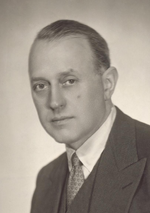
Bruce Hogg.
The North American economy remained depressed as the campaign for the 1938 Grand Council elections began. Watson was able to win the Liberal Party's nomination at the national convention in January 1938, and he vowed to make the election a plebiscite on war or peace. In his acceptance speech at the convention on 9 January 1938, Watson said, "Only a strong nation can be free and peaceful. If you vote for me, you are voting for the arms program. A vote for my opponent is a mandate for weakness, which would invite aggression and perhaps destroy not only Europe and us with it, but the world." Watson also noted the Dewey government's role in assisting the Galloway Plan in the 1920s. "If the truth were to be told, the Dewey government was more instrumental in aiding emigration than the Trust."
The People's Coalition nominated Hogg, who continued to oppose Watson's arms program, and also attacked Watson's failure to return the C.N.A. to prosperity nearly two years after the Panic. In his acceptance address on 17 January, Hogg said, "We have sufficient problems at home not to have to worry about the rest of the world. This February, the people will choose between the bankrupt candidate of a bankrupt party who would engage us in a war which we neither want nor need, from which we gain nothing; and the party of peace and recovery, one that is concerned with the Confederation of North America, and not the globe."
Along with his attacks on Watson's policies, Hogg also pledged to name James Billington of the Northern Confederation to the office of Council President. Billington was one of ten Negroes in the Grand Council, and if the Coalition won, he would occupy the highest office in the national government ever held by a member of his race.
The election was close, with the Liberals doing well in urban areas while the Coalition swept the suburbs and rural areas. This was a reversal of the pattern that was established during Dewey's administration in the 1920s, when the Liberals benefitted from the population diffusion of the Galloway Plan. Most political analysts credited Hogg's endorsement of Billington with swinging Southern Vandalia into the Coalition ranks, and giving Hogg a two-seat margin of victory in the Grand Council.
Global War and Unity Government[]
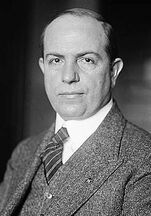
Hugh Devenny.
Although he was no longer governor-general, Watson was able to retain his seat in the Grand Council. When the Liberal caucus met after the election, however, Watson was passed over in favor of Hugh Devenny of the Northern Confederation for the position of Minority Leader. Watson remained a leading figure in the Liberal Party, and after a general war broke out in October 1939, Watson was among the Liberal councilmen who joined a unity government with Hogg's Coalitionists on 27 July 1940. Although Devenny remained the leader of the Liberal caucus in the Grand Council, Watson became Minister for Foreign Affairs in Hogg's Cabinet.
In a Cabinet meeting on 18 November 1942, members of both parties agreed that neither would hold a national convention. Instead, candidates for the Grand Council would run unpledged, and the next governor-general would be selected by the party that won a majority. Furthermore, if the Coalition remained in power, all the Liberals in the Cabinet would be retained. If the Liberals won, and either Watson or Devenny became governor-general, Hogg would become Minister of Foreign Affairs, and the other Coalitionists would remain at their posts. In the 1943 Grand Council elections, the P.C. increased its majority from 76 seats to 84, and Watson remained the Minister for Foreign Affairs.
Five years later, Watson chose to retire from the Grand Council, and following another Coalitionist victory in the 1948 Grand Council elections, Devenny took over as Minister for Foreign Affairs. Sobel makes no further mention of Watson after his retirement from the Council in 1948.
Sources[]
Sobel's sources for the political career of Douglas Watson are George Black's Armageddon, Watson Style (Burgoyne, 1934); Galloway's Selected Addresses (New York, 1935); Ezra Clarkson's The Financial Crisis of 1936: Prelude to Tragedy (New York, 1940); Douglas Watson, Jr.'s The Last Hope for Peace (New York, 1940); Jeffrey Martin's The Secret History of the Watson Administration (New York, 1944); Charles Simonson's The Year Without Politics: The C.N.A. in 1942 (New York, 1950); Benjamin Williamson's Watson Against the World: The Crisis of 1934 (New York, 1955); John Deak's The Britannic Design in the Twentieth Century (New York, 1959); and Jules Whitney's The Accidental Executive: The Political Life of Douglas Watson (New York, 1961).
This was the Featured Article for the week of 19 January 2014.
| Governors-General of the C.N.A. |
|---|
| Winfield Scott • Henry Gilpin • William Johnson • Whitney Hawkins • Kenneth Parkes • Herbert Clemens • John McDowell • Ezra Gallivan • Clifton Burgen • Christopher Hemingway • Albert Merriman • Calvin Wagner • Henderson Dewey • Douglas Watson • Bruce Hogg • James Billington • Richard Mason • Perry Jay • Carter Monaghan |
